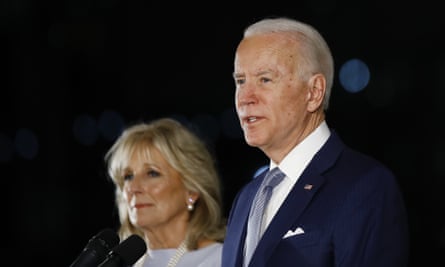Donald Trump had planned to run on a pledge to “Keep America great”. But with a global pandemic claiming the lives of more than 85,000 Americans and causing economic devastation, the slogan does not seem to hold the same promise it did at the start of the year – even for his most ardent fans.
In a recently released campaign ad titled American Comeback, the president instead returned to the “Make America great again” slogan that first brought him to power and whose Maga initials have become global shorthand for Trumpism and its adherents.
“We’ve built the greatest economy the world has ever seen and we’re going to do it again,” Trump says in the ad. “With the grace of God, we will win this war, and we will win this war quickly, and we will make America great again.”
With few positive messages available to them amid a once-in-a-century pandemic, the president’s advisers now appear to have replaced their plans with a multi-pronged attack strategy against Trump’s presumptive Democratic opponent, Joe Biden, hoping to chip away at the former vice-president’s support enough to propel Trump to victory.
This approach was on vivid display in a Trump campaign statement to the Guardian. “This election will be about the contrast between President Trump’s proven record and Joe Biden‘s decades of failure,” Sarah Matthews, the campaign’s deputy press secretary, said. “From his job-killing Green New Deal to his support for TPP and Nafta to his repeated denials that China is a threat to American jobs, Biden’s record proves he won’t fight for America’s interests.”
Several campaign communications experts said the pandemic had left Trump with few options but to attack his Democratic opponent in any way possible, including repeatedly mocking Biden as “Sleepy Joe” to question his mental acuity.
“They can’t run on the economy, and despite all their efforts to blame everyone else, they can’t run on their handling of the pandemic,” said the longtime Democratic strategist Bob Shrum. “Right now, I think that their only message is to go after Biden. … They’re just throwing up everything against the wall and hoping something sticks.”
Trump and his allies appear to be taking a localized approach, criticizing Biden on everything from trade to China relations to climate policy depending on which battleground state is the focus. As the president visited Pennsylvania on Thursday, the Republican National Committee went after Biden over the Green New Deal, whose framework the Democratic candidate has endorsed.
The president’s campaign was also eager to pounce on Biden’s verbal slip during a March primary debate when he appeared to endorse a ban on all fracking, a comment that the former vice-president’s team was forced to quickly clarify.
Local strategists say the president attacking Biden over fracking could prove effective in Pennsylvania, which Trump won by less than one point in 2016, because the state economy is propped up by fossil fuels.
“Hillary Clinton lost in 2016 largely because she was unpopular, but if there was a single issue that worked against her in Pennsylvania, it was her war on fossil fuels,” said Charlie Gerow, a veteran Republican strategist based in Harrisburg, the state capital.
But several recent polls show Trump losing ground in key battleground states that were critical to his 2016 victory, including Michigan, Pennsylvania and Wisconsin.

Four years ago, Hillary Clinton’s primary losses to Bernie Sanders in Michigan and Wisconsin were “a sign of things to come”, said Ben Tulchin, a pollster for Sanders’ 2016 and 2020 presidential campaigns.
“They exposed weaknesses that her campaign never really addressed,” he said. “But Biden doesn’t have those same kind of vulnerabilities.”
In 2020, Biden dominated Sanders in the primaries in Michigan and Wisconsin. Though Pennsylvania hasn’t held its primary yet, it is the state where Biden has headquartered his campaign and where he was born, factors that could hinder a localized attack strategy from the president and his allies.
Other presidential campaign alumni added that Trump’s localized attacks would only prove successful if he could find a centralized message uniting all the various pieces of criticism.
“The attacks the president’s team are making to try to chip away at [Biden’s] advantages in those critical states [are] absolutely smart, absolutely make sense, but they need to be part of an overall structure,” said Michael Steel, who served as a senior adviser on Jeb Bush’s 2016 presidential campaign.
Steel suggested the Trump campaign’s criticism of China might fuel the “likeliest effective attack” against Biden, as the president tries to blame Beijing for the spread of coronavirus.
The Trump campaign released a new ad last week featuring some of Biden’s past comments on China to depict the former vice-president as too cozy with Beijing. The pro-Trump America First Action Pac has also launched a $10m ad buy in Michigan, Pennsylvania and Wisconsin as part of its “Beijing Biden” ad campaign.
“He’s been very successful at identifying an enemy and so that’s his formula,” Paul Maslin, a longtime Democratic pollster based in Wisconsin, said of the attack ads. “And right now, what other choice does he have?”
But despite the president’s efforts to deflect blame, Maslin predicted the November election would ultimately come down to voters’ opinion on Trump’s handling of the pandemic.
“In a time of unbelievable national angst and worry, of economic dislocation and with concerns about health and everything that this virus has become, if he can’t win back voters on his own merit, then all the rest of it is going to be mostly irrelevant,” Maslin said.
